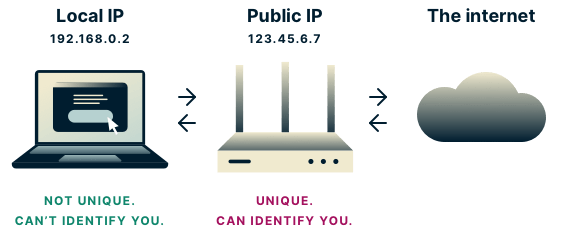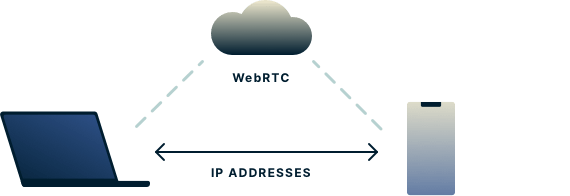Εργαλεία ασφάλειας ExpressVPN
Πώς να χρησιμοποιήσετε το εργαλείο ελέγχου διαρροών WebRTC
Ποια είναι η διαφορά μεταξύ δημόσιων και τοπικών διευθύνσεων IP;
Όταν χρησιμοποιείτε το εργαλείο ανίχνευσης διαρροής, θα δείτε δύο κατηγορίες διευθύνσεων IP: δημόσιες και τοπικές.

Οι δημόσιες διευθύνσεις IP είναι ιδιαίτερα συγκεκριμένες προς εσάς. Αποτελούν μέρος της ταυτότητάς σας στο διαδίκτυο. Όταν χρησιμοποιείτε VPN, οι ιστότοποι βλέπουν τη δημόσια διεύθυνση IP του διακομιστή VPN αντί για τη δική σας, και η ταυτότητά σας προστατεύεται.
Ωστόσο, αν το WebRTC ανιχνεύσει τη δημόσια διεύθυνση IP σας όταν είστε συνδεδεμένοι στο VPN, σε αντίθεση με αυτήν του διακομιστή του VPN, τότε οι τρίτοι μπορούν ακόμα να τη χρησιμοποιήσουν για να σας αναγνωρίσουν. Αν δείτε μια δημόσια διεύθυνση IP στα αποτελέσματα της δοκιμής, τότε μπορεί να έχετε διαρροή ιδιωτικότητας.
Οι τοπικές διευθύνσεις IP δεν είναι συγκεκριμένες προς εσάς. Αυτές οι διευθύνσεις IP σας αποδίδονται από τον δρομολογητή σας και επαναχρησιμοποιούνται εκατομμύρια φορές από δρομολογητές σε όλο τον κόσμο. Έτσι, αν ένα τρίτο μέρος γνωρίζει την τοπική διεύθυνση IP σας, δεν έχει κανένα τρόπο να τη συνδέσει απευθείας με εσάς. Αν δείτε μια τοπική διεύθυνση IP στα αποτελέσματα της δοκιμής, δεν είναι απειλή για την ιδιωτικότητά σας.
5 βήματα για να δοκιμάσετε για διαρροή WebRTC (με και χωρίς VPN)
Αν δεν χρησιμοποιείτε VPN, αναμφίβολα θα εκθέσετε κάποιες ιδιωτικές πληροφορίες σε τρίτους. (Θέλετε να μάθετε περισσότερα; Δείτε πώς ένα VPN κρύβει τη διεύθυνση IP σας για να κρατήσει τις πληροφορίες σας ιδιωτικές.)
Αν χρησιμοποιείτε VPN και το εργαλείο διαρροής δηλώνει ότι μπορεί να υπάρχει διαρροή, μπορείτε να εκτελέσετε την ακόλουθη δοκιμή διαρροής για να βεβαιωθείτε:
-
Αποσυνδεθείτε από το VPN σας και ανοίξτε αυτή τη σελίδα σε νέα καρτέλα ή παράθυρο
-
Καταγράψτε οποιεσδήποτε δημόσιες διευθύνσεις IP που βλέπετε
-
Κλείστε τη σελίδα
-
Συνδεθείτε στο VPN σας και ανοίξτε ξανά τη σελίδα
-
Αν εξακολουθείτε να βλέπετε οποιεσδήποτε δημόσιες διευθύνσεις IP από το Βήμα 2, τότε έχετε διαρροή ιδιωτικότητας
Αν χρησιμοποιείτε ένα VPN και το εργαλείο σας λέει σαφώς ότι δεν υπάρχει διαρροή, είστε ασφαλείς!
Θέλετε να ελέγξετε για άλλες διαρροές ιδιωτικότητας; Δοκιμάστε αυτά τα εργαλεία:
Τι είναι το WebRTC;
Η επικοινωνία σε πραγματικό χρόνο μέσω ιστού (WebRTC) είναι μια συλλογή τυποποιημένων τεχνολογιών που επιτρέπει στους περιηγητές ιστού να επικοινωνούν άμεσα μεταξύ τους χωρίς την ανάγκη ενός ενδιάμεσου διακομιστή. Τα οφέλη του WebRTC περιλαμβάνουν: ταχύτερες ταχύτητες και λιγότερη καθυστέρηση για διαδικτυακές εφαρμογές όπως συνομιλία βίντεο, μεταφορά αρχείων και ζωντανή ροή.

Δύο συσκευές που επικοινωνούν απευθείας μέσω WebRTC πρέπει να γνωρίζουν τις πραγματικές διευθύνσεις IP η μία της άλλης. Θεωρητικά, αυτό θα μπορούσε να επιτρέψει σε έναν ιστότοπο τρίτου μέρους να εκμεταλλευτεί το WebRTC στον περιηγητή σας για να εντοπίσει την πραγματική διεύθυνση IP σας και να τη χρησιμοποιήσει για να σας αναγνωρίσει. Αυτή είναι μια διαρροή WebRTC.
Οποιαδήποτε διαρροή της δημόσιας διεύθυνσης IP σας είναι απειλή για την ιδιωτικότητά σας, αλλά οι διαρροές WebRTC είναι λιγότερο γνωστές και εύκολα παραβλέπονται, και δεν σας προστατεύουν όλοι οι πάροχοι VPN από αυτές!
Πώς μία διαρροή WebRTC θέτει σε κίνδυνο την ιδιωτικότητά μου;
Το πρόβλημα με το WebRTC είναι ότι χρησιμοποιεί τεχνικές για την ανακάλυψη των διευθύνσεων IP σας που είναι πιο προηγμένες από αυτές που χρησιμοποιούνται στη “συμβατική” ανίχνευση IP.
Πώς το WebRTC ανιχνεύει τις διευθύνσεις IP μου;
Το WebRTC ανακαλύπτει διευθύνσεις IP μέσω του πρωτοκόλλου Interactive Connectivity Establishment (ICE). Αυτό το πρωτόκολλο καθορίζει διάφορες τεχνικές για την ανακάλυψη διευθύνσεων IP, δύο εκ των οποίων καλύπτονται παρακάτω.
Διακομιστές STUN/TURN
Οι Διακομιστές STUN/TURN παίζουν δύο βασικούς ρόλους στο WebRTC: Επιτρέπουν στους περιηγητές ιστού να θέτουν το ερώτημα “Ποιες είναι οι δημόσιες διευθύνσεις IP μου;” και επίσης διευκολύνουν δύο συσκευές να επικοινωνούν μεταξύ τους ακόμα και αν βρίσκονται πίσω από τοίχους προστασίας NAT. Ο πρώτος είναι αυτός που μπορεί να επηρεάσει την ιδιωτικότητά σας. Οι διακομιστές STUN/TURN ανακαλύπτουν τις διευθύνσεις IP σας όπως ακριβώς ένας ιστότοπος βλέπει τις διευθύνσεις IP σας όταν τον επισκέπτεστε.
Ανακάλυψη υποψηφίων
Οι περισσότερες συσκευές έχουν πολλαπλές διευθύνσεις IP συνδεδεμένες με το υλικό τους. Συνήθως αυτές είναι κρυμμένες από τους ιστότοπους και τους διακομιστές STUN/TURN μέσω τοίχων προστασίας. Ωστόσο, το πρωτόκολλο ICE καθορίζει ότι οι περιηγητές μπορούν να συλλέγουν αυτές τις διευθύνσεις IP απλά διαβάζοντάς τες από τη συσκευή σας.
Οι διευθύνσεις IP που συνήθως συνδέονται με τη συσκευή σας είναι τοπικές διευθύνσεις IPv4, και η ανακάλυψή τους δεν θα επηρεάσει την ιδιωτικότητά σας. Ωστόσο, αν έχετε διευθύνσεις IPv6, τότε η ιδιωτικότητά σας μπορεί να κινδυνεύει.
Οι διευθύνσεις IPv6 δεν λειτουργούν το ίδιο με τις διευθύνσεις IPv4. Γενικά, μια διεύθυνση IPv6 είναι δημόσια (που σημαίνει ότι είναι μοναδική για εσάς). Αν μια διεύθυνση IPv6 είναι συνδεδεμένη με τη συσκευή σας και ανιχνεύεται μέσω ICE, τότε η ιδιωτικότητά σας μπορεί να εκτεθεί.
Ένας κακόβουλος ιστότοπος μπορεί να χρησιμοποιήσει διακομιστές STUN/TURN ή ανακάλυψη υποψηφίων για να ξεγελάσει τον περιηγητή σας στο να αποκαλύψει μια διεύθυνση IP που μπορεί να σας αναγνωρίσει, χωρίς τη γνώση σας.
Διαρροές WebRTC: Ποιοι περιηγητές είναι οι πιο ευάλωτοι;
Σύμφωνα με τα στοιχεία που έχουμε έως τώρα, οι χρήστες των Firefox, Chrome, Opera και Microsoft Edge είναι οι πιο ευάλωτοι σε διαρροές WebRTC επειδή αυτοί οι περιηγητές έχουν ενεργοποιημένο το WebRTC από προεπιλογή.
Σημειώστε ότι ίσως να είστε ασφαλείς από διαρροές WebRTC σε έναν περιηγητή και όχι σε έναν άλλο. Αν χρησιμοποιείτε συχνά πολλαπλούς περιηγητές, τότε πρέπει να σκεφτείτε να χρησιμοποιήσετε το Τεστ Διαρροής WebRTC της ExpressVPN σε καθέναν από αυτούς.
Τι κάνει η ExpressVPN για να με προστατεύσει από διαρροές WebRTC;
H ExpressVPN εργάζεται σκληρά για να διασφαλίσει ότι οι εφαρμογές της σας προστατεύουν από διαρροές WebRTC. Όταν ανοίγετε νέες ιστοσελίδες ενώ είστε συνδεδεμένοι στην ExpressVPN, οι δημόσιες διευθύνσεις IP σας δεν θα διαρρεύσουν.
Ορισμένοι περιηγητές, ωστόσο, μπορεί να είναι επιθετικοί όταν πρόκειται να διατηρήσουν δεδομένα από παλιές καρτέλες. Αν έχετε μια καρτέλα που άνοιξε από πριν να συνδεθείτε στο VPN, η πραγματική διεύθυνση IP σας μπορεί να είναι αποθηκευμένη στη μνήμη από τον περιηγητή. Αυτές οι διευθύνσεις IP μπορεί να παραμείνουν ακόμα και αν ανανεώσετε την καρτέλα, θέτοντας την ιδιωτικότητά σας σε κίνδυνο.
Η επέκταση προγράμματος περιήγησης ExpressVPN (διαθέσιμη αυτήν τη στιγμή για Chrome, Firefox και Edge) λύνει αυτό το πρόβλημα επιτρέποντάς σας να απενεργοποιήσετε πλήρως το WebRTC από το μενού ρυθμίσεων, διασφαλίζοντας ότι δεν είστε ευάλωτοι σε προβλήματα προσωρινής αποθήκευσης.
Πώς οι ειδικοί μηχανικοί της ExpressVPN που ασχολούνται με την προστασία από διαρροές σάς κρατούν ασφαλείς
Το ExpressVPN σας προστατεύει από ένα ευρύ φάσμα διαρροών WebRTC σε διάφορους περιηγητές και πλατφόρμες. Επειδή το WebRTC είναι ακόμα μία σχετικά νέα τεχνολογία, είναι σημαντικό να δοκιμάζονται συνεχώς διαφορετικά σενάρια για διαρροές WebRTC σε διάφορες πλατφόρμες και περιηγητές. Η ExpressVPN πρωτοστατεί στον κλάδο με μια ομάδα ειδικευμένων μηχανικών που διερευνούν συνεχώς νέους δρόμους διαρροής και αναπτύσσουν γρήγορα οποιοδήποτε απαραίτητο διορθωτικό.
Πώς αλλιώς μπορώ να αποτρέψω διαρροές WebRTC;
Εκτός από τη χρήση του ExpressVPN, μπορείτε να προστατευθείτε κατά των διαρροών απενεργοποιώντας το WebRTC στον περιηγητή σας χειροκίνητα.*
Πώς να απενεργοποιήσετε το WebRTC στο Firefox σε επιτραπέζιο υπολογιστή
- Πληκτρολογήστε about:config στη γραμμή διευθύνσεων
- Κάντε κλικ στο κουμπί «Αποδέχομαι το κίνδυνο!» που εμφανίζεται
- Πληκτρολογήστε media.peerconnection.enabled στη γραμμή αναζήτησης
- Κάντε διπλό κλικ για να αλλάξετε την τιμή σε “false”
Αυτό θα πρέπει να λειτουργήσει τόσο στις κινητές όσο και στις εκδόσεις του Firefox για σταθερούς υπολογιστές.
Πώς να απενεργοποιήσετε το WebRTC στον Chrome σε επιτραπέζιο υπολογιστή
Υπάρχουν δύο επεκτάσεις για το Chrome που είναι γνωστό ότι μπλοκάρουν επιτυχώς τις διαρροές WebRTC:
Το uBlock Origin είναι ένας γενικός αποκλειστής που μπλοκάρει διαφημίσεις, ανιχνευτές, κακόβουλο λογισμικό και έχει τη δυνατότητα να μπλοκάρει το WebRTC. Το WebRTC Network Limiter είναι μια επίσημη προσθήκη της Google που σταματάει διαρροές IP χωρίς να μπλοκάρει εντελώς το WebRTC.
Πώς να απενεργοποιήσετε το WebRTC στο Safari σε επιτραπέζιο υπολογιστή
Δεν υπάρχει λόγος να απενεργοποιήσετε το WebRTC στο Safari. Το μοντέλο αδειών του Safari είναι πιο αυστηρό από αυτό των περισσότερων περιηγητών. Από προεπιλογή, καμία διεύθυνση IP δεν είναι διαθέσιμη σε ιστότοπους εκτός από αυτή που χρησιμοποιείτε για να έχετε πρόσβαση στον ιστότοπο. Επομένως, δεν χρειάζεται να κάνετε καμία επιπλέον ενέργεια για να προλάβετε διαρροές WebRTC στο Safari. Σημειώστε, ωστόσο, ότι αν δώσετε άδεια σε οποιονδήποτε ιστότοπο να χρησιμοποιεί ήχο ή βίντεο, μπορεί να εκθέσετε διευθύνσεις IP.
Πώς να απενεργοποιήσετε το WebRTC στο Opera σε επιτραπέζιο υπολογιστή
- Ανοίξτε τις Ρυθμίσεις στο Opera. Για να το κάνετε αυτό:
- Σε Windows ή Linux, κάντε κλικ στο λογότυπο του Opera στην πάνω αριστερή γωνία του παραθύρου του προγράμματος περιήγησης
- Σε Mac, κάντε κλικ στο Opera στη γραμμή εργαλείων και εντοπίστε τις ρυθμίσεις στο Προτιμήσεις
- Επεκτείνετε την ενότητα Προχωρημένοι στην αριστερή πλευρά και κάντε κλικ στο Απόρρητο & Ασφάλεια
- Κάντε κύλιση προς τα κάτω στο WebRTC και επιλέξτε το κουμπί ραδιοφώνου Απενεργοποίηση μη-προωθούμενων UDP
- Κλείστε την καρτέλα και οι ρυθμίσεις θα αποθηκευτούν αυτόματα
Πώς να απενεργοποιήσετε το WebRTC στον Microsoft Edge
Δυστυχώς, προς το παρόν δεν υπάρχει τρόπος να απενεργοποιήσετε πλήρως το WebRTC στο Microsoft Edge. Ωστόσο, μπορείτε να ρυθμίσετε τον περιηγητή σας ώστε να κρύβει την τοπική διεύθυνση IP σας αν:
- Πληκτρολογήστε about:flags στη γραμμή διευθύνσεων
- Επιλέξτε την επιλογή με την ένδειξη Απόκρυψη της τοπικής διεύθυνσης IP μου στις συνδέσεις WebRTC
Όπως αναφέρθηκε παραπάνω, η αποκάλυψη της τοπικής διεύθυνσης IP σας δεν αποτελεί απειλή για την ιδιωτικότητά σας, οπότε τα παραπάνω βήματα προσφέρουν λίγα οφέλη. Συνεπώς, ο καλύτερος τρόπος να σταματήσετε τις διαρροές WebRTC ενώ χρησιμοποιείτε το Microsoft Edge είναι χρησιμοποιώντας το ExpressVPN εφαρμογή για Windows.
*Η απενεργοποίηση του WebRTC πιθανότατα δεν θα επηρεάσει την κανονική περιήγηση στο διαδίκτυο. Οι περισσότεροι ιστότοποι δεν εξαρτώνται από αυτό… ακόμα. Αλλά καθώς το WebRTC γίνεται πιο δημοφιλές, η λειτουργικότητα ορισμένων ιστότοπων μπορεί να μειωθεί αν το απενεργοποιήσετε πλήρως.
Τι αν είμαι συνδεδεμένος στην ExpressVPN, και εξακολουθώ να βλέπω μια διαρροή WebRTC σε αυτή τη σελίδα;
Επικοινωνήστε με την Υποστήριξη ExpressVPN, και θα το τακτοποιήσουμε άμεσα.
